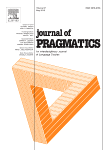Zsófia Demjén
News
Our new textbook Researching Language and Health has just been published by Routledge.
The book highlights key themes, guides readers through the design stages of research and the ethical considerations specific to linguistic health research, and brings methods and methodologies to life by demonstrating how these can be applied to specific issues in context. Covering a wide range of health conditions, healthcare contexts, and data types, with an emphasis on those most accessible to students and new researchers, the authors foreground the ‘so what?’ of research and the impact that linguistic studies can have.
The UCL Centre for Applied Linguistics has just joined the International Consortium for Communication in Healthcare (IC4CH).
Very excited to be working with leading experts from lots of different contexts!

My latest book was released recently and I made my first ever TikTok to mark the occasion...
As a special treat, you get 35% off by entering 'GLR TW4' on the Bloomsbury shop.
I was honoured to give one of the UCL Lunch Hour Lectures this season. I spoke about a recent project where we look at how voices that others cannot hear can exert so much power. The talk is available on YouTube.
Our new research monograph 'Metaphor, Cancer and the End of Life: A Corpus-Based Study' has just been published. The book presents the methodology, findings and implications of a large-scale corpus-based study of the metaphors used to talk about cancer and the end of life (including care at the end of life) in the UK. It focuses on metaphor as a central linguistic and cognitive tool that is frequently used to talk and think about sensitive and subjective experiences, such as illness, emotions, death, and dying, and that can both help and hinder communication and well-being, depending on how it is used. Includes chapters on Violence Metaphors, Journey Metaphors, Metaphors for Good and Bad Deaths, Humour, among others.
You can preview the book here.
I've been elected as Ordinary Member of the British Association for Applied Linguistics' executive committee. I'll be working on broadening the understanding of applied linguistics, and on setting up a mentorship scheme.
New job at UCL going well so far :)
I've managed to get funding for three different projects. Two are outlined here, the third is also a small pilot study looking at ways of assessing the impact of poetry therapy.
The Routledge Handbook of Metaphor and Language, edited by Elena Semino and myself, has just been published.
In 35 chapters, it provides a comprehensive overview (if I dare say so myself) of state-of-the-art interdisciplinary research on metaphor and language, including chapters on how metaphor can be put to use in different contexts. You can preview the book here.
I recently had my first radio outing - eeek!!
I can be heard discussing everyday use of mental health terms in BBC Radio4's All in the Mind, presented by Claudia Hammond.
I'm organising a one-day symposium for the BAAL Health & Science Communication SIG.
Title: Experiences of illness and death: learning from the discourses of realities and fictions
Date: 28 November 2016
Venue: Open University, Milton Keynes
Registration here.
It'll be my last event at the OU, before I move to UCL. Join us!
I've had a paper published in the Journal of Pragmatics!
Laughing at Cancer: Humour, empowerment, solidarity, and coping online.
They say that this means you've arrived as a linguist ;)
It's Open Access and I've made some audio slides to introduce it:
For Depression Awareness Week 2016, I was interviewed by The Open University about my work on mental health and language
I was recently interviewed for Vice Magazine on the everyday use of mental health terms. I talked about why people might casually exclaim ‘I’m so bipolar/depressed’ and why it might be problematic. Read the article here.
My first-ever book is finally out, so I'm officially on Amazon :)
It's gotten some reviews too:
“Zsófia Demjén has written a meticulous and illuminating interdisciplinary study of Sylvia Plath's journals. She makes a strong case for their capacity to provide real insight into the writer's experiences of mental illness. I was particularly struck by Demjén's emphasis on the usefulness of these journal entries to others, as articulations of suffering that we often cannot voice ourselves. Though academically rigorous and methodical, the book also makes for fascinating and highly compelling reading. Whilst rightly careful to discourage a reading of Plath's entire published creative output through a simplistic biographical lens, Demjén's evaluation of these journals validates our instinct to regard Plath's depression as relevant to an understanding of the writer and her work.” – Rachel Kelly, author of 'Black Rainbow: how words healed me - my journey through depression'
“This book is a major incursion of a linguist into the realms of clinical psychology and psychopathology and one which I welcome. It lays down very well the variety of tools discourse analysis offers in helping understand the experiences which have hitherto been the domain of mental health care professionals.” – Dariusz Galasinski, Professor of Discourse and Cultural Studies, University of Wolverhampton, UK,
“This is a rich, timely and fascinating book. Zsófia Demjén deftly and intricately combines methodological and analytical approaches in order to examine, with true rigour and insight, the language of one of the 20th Century's most powerfully and disturbingly eloquent stylists. Focusing on Plath's intimate and affecting 'Smith Journal', Demjén systematically explores the interface between emotional turmoil and its textual encoding, revealing how this alluringly manneristic writer harnesses the resources of language in order to articulate profound psychological distress. Sylvia Plath and the Language of Affective States will be of interest to students and scholars of literature and language, not to mention the more general reader piqued by all things Plath.” – Kevin Harvey, Lecturer in Sociolinguistics, University of Nottingham, UK














